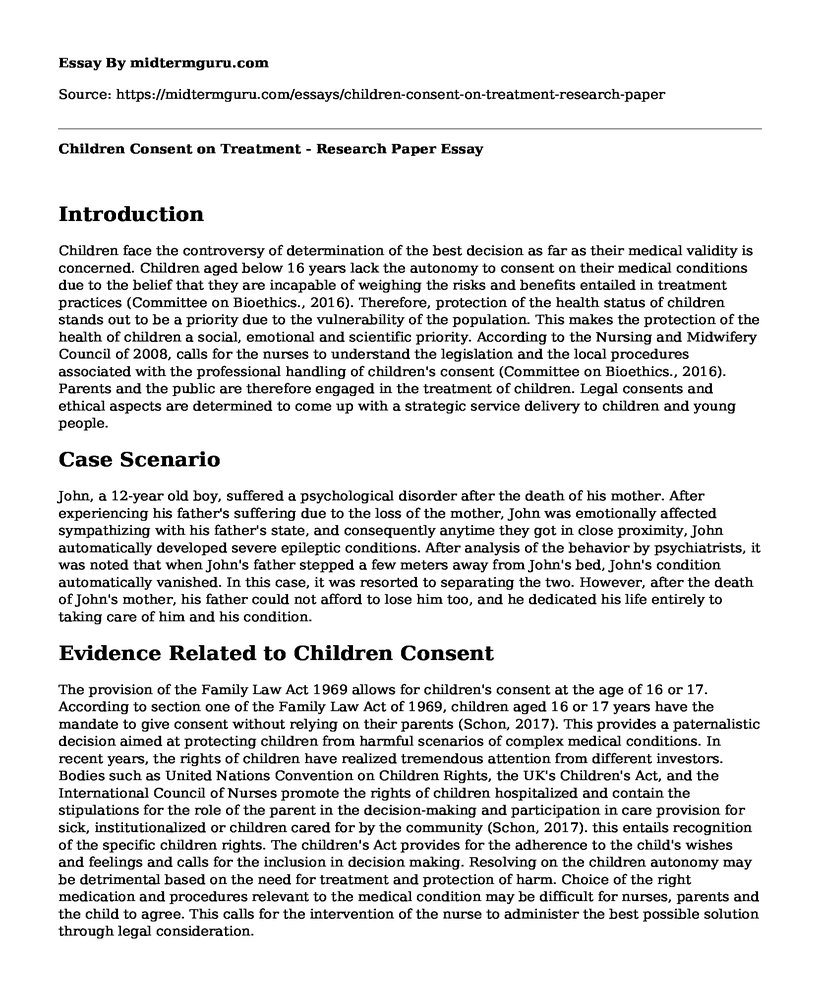Introduction
Children face the controversy of determination of the best decision as far as their medical validity is concerned. Children aged below 16 years lack the autonomy to consent on their medical conditions due to the belief that they are incapable of weighing the risks and benefits entailed in treatment practices (Committee on Bioethics., 2016). Therefore, protection of the health status of children stands out to be a priority due to the vulnerability of the population. This makes the protection of the health of children a social, emotional and scientific priority. According to the Nursing and Midwifery Council of 2008, calls for the nurses to understand the legislation and the local procedures associated with the professional handling of children's consent (Committee on Bioethics., 2016). Parents and the public are therefore engaged in the treatment of children. Legal consents and ethical aspects are determined to come up with a strategic service delivery to children and young people.
Case Scenario
John, a 12-year old boy, suffered a psychological disorder after the death of his mother. After experiencing his father's suffering due to the loss of the mother, John was emotionally affected sympathizing with his father's state, and consequently anytime they got in close proximity, John automatically developed severe epileptic conditions. After analysis of the behavior by psychiatrists, it was noted that when John's father stepped a few meters away from John's bed, John's condition automatically vanished. In this case, it was resorted to separating the two. However, after the death of John's mother, his father could not afford to lose him too, and he dedicated his life entirely to taking care of him and his condition.
Evidence Related to Children Consent
The provision of the Family Law Act 1969 allows for children's consent at the age of 16 or 17. According to section one of the Family Law Act of 1969, children aged 16 or 17 years have the mandate to give consent without relying on their parents (Schon, 2017). This provides a paternalistic decision aimed at protecting children from harmful scenarios of complex medical conditions. In recent years, the rights of children have realized tremendous attention from different investors. Bodies such as United Nations Convention on Children Rights, the UK's Children's Act, and the International Council of Nurses promote the rights of children hospitalized and contain the stipulations for the role of the parent in the decision-making and participation in care provision for sick, institutionalized or children cared for by the community (Schon, 2017). this entails recognition of the specific children rights. The children's Act provides for the adherence to the child's wishes and feelings and calls for the inclusion in decision making. Resolving on the children autonomy may be detrimental based on the need for treatment and protection of harm. Choice of the right medication and procedures relevant to the medical condition may be difficult for nurses, parents and the child to agree. This calls for the intervention of the nurse to administer the best possible solution through legal consideration.
Analysis and Comparison
Controversy sets in the determination of the treatment for the epileptic scenes in John's condition. John could not accept to be separated from his father while his father could not consent to the same regardless of clarification of John's condition. Based on the 1989 Children Act, the parent was entitled to consenting on the medical terms of children. However, in this condition, the parent, the sole consent provider had an input on the condition. With conflicting obligations and ethical dilemma, the nurse in charge takes up to the hospital administration to engage child protection agencies after convening an ethics committee to determine the validity of the case (Holloway & Galvin, 2016). John's life is at stake, and the best measure is to separate him from his father. The actions of the nurses are consistent with the principle of beneficence which the nurse strives to protect the interests of their client (Holloway & Galvin, 2016). On the other hand, the ethical principle of nonmaleficence was favored with the fear for the client to be exposed to more harm.
Self-Evaluation
Based on the case scenario, it is evident that medical practitioners are faced with a difficult task to protect their clients. In some cases, going to the extremes of separating families. This seems harsh but as per the principle of beneficence and the ethical principle of nonmaleficence, the nurse basing on the International Council of Nurse's provision, has a role in protecting the safety of children.
References
Committee on Bioethics. (2016). Informed consent in decision-making in pediatric practice. Pediatrics, e20161484.
Holloway, I., & Galvin, K. (2016). Qualitative research in nursing and healthcare. John Wiley & Sons.
Schon, D. A. (2017). The reflective practitioner: How professionals think in action. Routledge.
Cite this page
Children Consent on Treatment - Research Paper. (2022, Oct 14). Retrieved from https://midtermguru.com/essays/children-consent-on-treatment-research-paper
If you are the original author of this essay and no longer wish to have it published on the midtermguru.com website, please click below to request its removal:
- Therapeutic Relationship in Nursing Practice - Nursing Essay Sample
- Nursing Paper Example: What Are the Health Literacy Challenges Faced by Elderly Individuals?
- A Healthy Pregnancy - Essay Sample
- Top 5 Things to Better Manage Medical Risk in Hospitals - Essay Sample
- Diana's 12-Week Transformation: Training for a High School Reunion - Essay Sample
- Can We Win the War Against Cancer? A Look at the Growing Crisis - Research Paper
- Managing Cancer Risk: Smoking and Avoids Relapse - Essay Sample







